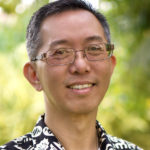Session Description
LTEC 652D is a graduate learning design and technology elective course at the College of Education, University of Hawaii which provides hands-on experiential learning and is designed to enable graduate students to design, develop, and evaluate instruction in 3-dimensional virtual worlds (3D VWs) such as Second Life, OpenSim and Minecraft. Students identify and analyze emerging research, as well as tools, pedagogy, teaching environments, content resources, and assessments for virtual world teaching. In addition to leveraging 3D VWs as a distance learning delivery tool, the students research the various ways that 3D VWs can be leveraged for instructional purposes, such as exploring other educational Second Life builds and evaluating the design of educational simulations in 3D VWs. The final course design project is the creation of a virtual world instructional module by student teams. Working in self-selected three-person teams, students collaboratively design, develop and evaluate instruction in their choice of 3D VWs. This presentation will provide an overview of the 3D VW course and analyze a total of 34 3D VW student design projects from 2009 - 2020. A summary of trends and patterns regarding the topics and choice of 3D VWs will be presented. Reflections and lessons learned from the analysis will be shared.
Presenter(s)
 Peter Leong
Peter Leong
University of Hawaii-Manoa, Honolulu
Dr. Peter Leong is an Associate Professor with the Department of Learning Design & Technology, University of Hawaii-Manoa. He has extensive experience in the development and delivery of online courses and distance education. Dr. Leong was honored as one of Hawaii’s 2007 top high-technology leaders and was recognized with the University of Hawaii Board of Regents’ Medal for Teaching Excellence award in 2012. Dr. Leong was the developer of the College of Education’s island in Second Life and he organized the first virtual graduation at UHM, which allowed LTEC students both on Oahu and off-island to experience a virtual graduation ceremony in spring 2010. He was a co-investigator on a National Science Foundation (NSF) grant to evaluate new approaches to improving engagement, diversity, and retention in undergraduate computer science and currently serves as a co-investigator of a Computer Science for All NSF grant focused on culturally-relevant computing . His research interests include culturally-relevant computing, student satisfaction with online learning, faculty support for technology integration, technologies for distance education and teaching & learning in virtual worlds.
